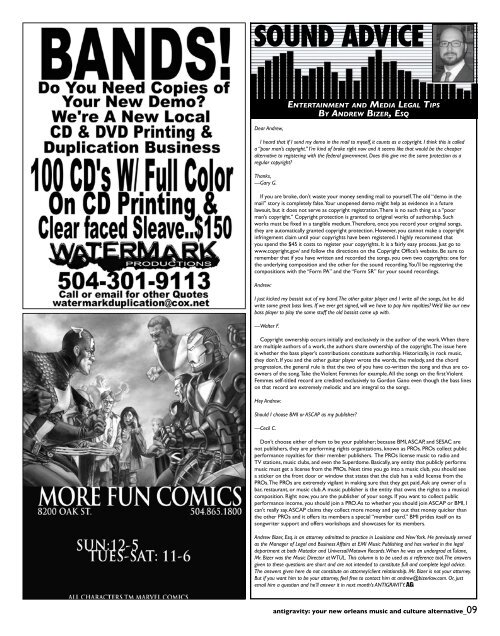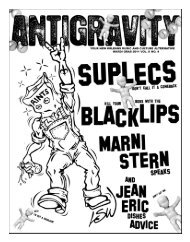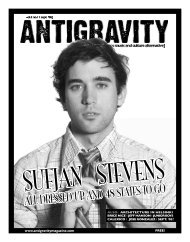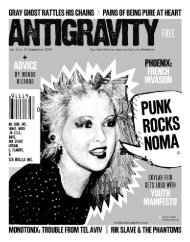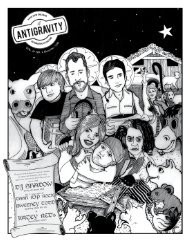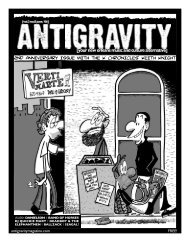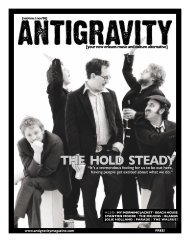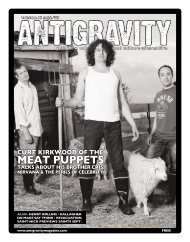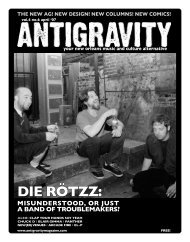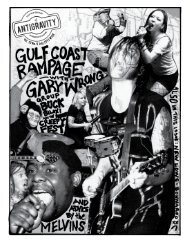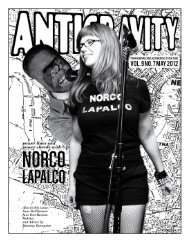January 2007 (PDF) - Antigravity Magazine
January 2007 (PDF) - Antigravity Magazine
January 2007 (PDF) - Antigravity Magazine
- No tags were found...
You also want an ePaper? Increase the reach of your titles
YUMPU automatically turns print PDFs into web optimized ePapers that Google loves.
SOUND ADVICEDear Andrew,ENTERTAINMENT AND MEDIA LEGAL TIPSBY ANDREW BIZER, ESQI heard that if I send my demo in the mail to myself, it counts as a copyright. I think this is calleda “poor man’s copyright.” I’m kind of broke right now and it seems like that would be the cheaperalternative to registering with the federal government. Does this give me the same protection as aregular copyright?Thanks,—Gary G.If you are broke, don’t waste your money sending mail to yourself. The old “demo in themail” story is completely false. Your unopened demo might help as evidence in a futurelawsuit, but it does not serve as copyright registration. There is no such thing as a “poorman’s copyright.” Copyright protection is granted to original works of authorship. Suchworks must be fixed in a tangible medium. Therefore, once you record your original songs,they are automatically granted copyright protection. However, you cannot make a copyrightinfringement claim until your copyrights have been registered. I highly recommend thatyou spend the $45 it costs to register your copyrights. It is a fairly easy process. Just go towww.copyright.gov/ and follow the directions on the Copyright Office’s website. Be sure toremember that if you have written and recorded the songs, you own two copyrights: one forthe underlying composition and the other for the sound recording. You’ll be registering thecompositions with the “Form PA” and the “Form SR” for your sound recordings.Andrew:I just kicked my bassist out of my band. The other guitar player and I write all the songs, but he didwrite some great bass lines. If we ever get signed, will we have to pay him royalties? We’d like our newbass player to play the same stuff the old bassist came up with.—Walter F.Copyright ownership occurs initially and exclusively in the author of the work. When thereare multiple authors of a work, the authors share ownership of the copyright. The issue hereis whether the bass player’s contributions constitute authorship. Historically, in rock music,they don’t. If you and the other guitar player wrote the words, the melody, and the chordprogression, the general rule is that the two of you have co-written the song and thus are coownersof the song. Take the Violent Femmes for example. All the songs on the first ViolentFemmes self-titled record are credited exclusively to Gordon Gano even though the bass lineson that record are extremely melodic and are integral to the songs.Hey Andrew:Should I choose BMI or ASCAP as my publisher?—Cecil C.Don’t choose either of them to be your publisher; because BMI, ASCAP, and SESAC arenot publishers, they are performing rights organizations, known as PROs. PROs collect publicperformance royalties for their member publishers. The PROs license music to radio andTV stations, music clubs, and even the Superdome. Basically, any entity that publicly performsmusic must get a license from the PROs. Next time you go into a music club, you should seea sticker on the front door or window that states that the club has a valid license from thePROs. The PROs are extremely vigilant in making sure that they get paid. Ask any owner of abar, restaurant, or music club. A music publisher is the entity that owns the rights to a musicalcomposition. Right now, you are the publisher of your songs. If you want to collect publicperformance income, you should join a PRO. As to whether you should join ASCAP or BMI, Ican’t really say. ASCAP claims they collect more money and pay out that money quicker thanthe other PROs and it offers its members a special “member card.” BMI prides itself on itssongwriter support and offers workshops and showcases for its members.Andrew Bizer, Esq. is an attorney admitted to practice in Louisiana and New York. He previously servedas the Manager of Legal and Business Affairs at EMI Music Publishing and has worked in the legaldepartment at both Matador and Universal/Motown Records. When he was an undergrad at Tulane,Mr. Bizer was the Music Director at WTUL. This column is to be used as a reference tool. The answersgiven to these questions are short and are not intended to constitute full and complete legal advice.The answers given here do not constitute an attorney/client relationship. Mr. Bizer is not your attorney.But if you want him to be your attorney, feel free to contact him at andrew@bizerlaw.com. Or, justemail him a question and he’ll answer it in next month’s ANTIGRAVITY.antigravity: your new orleans music and culture alternative_09


